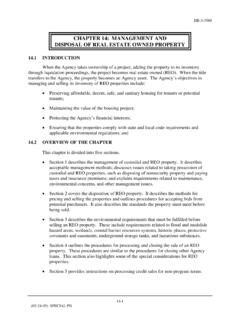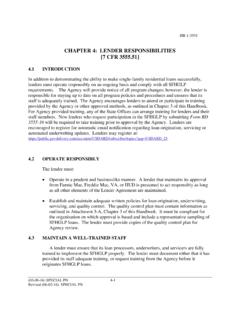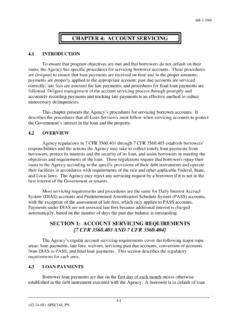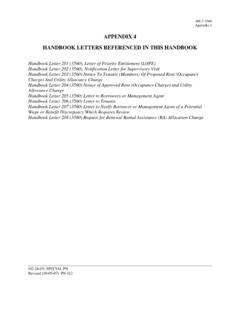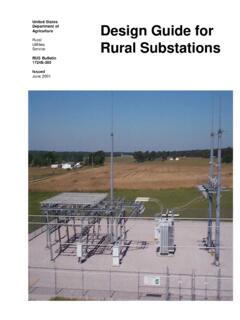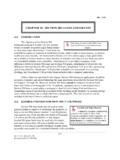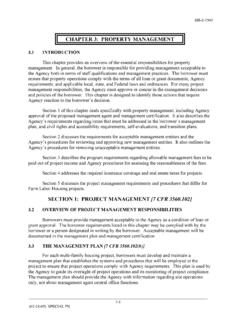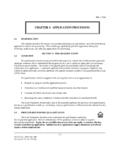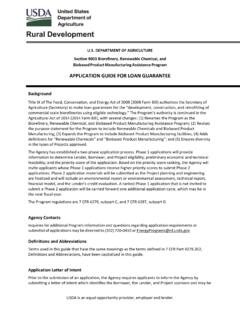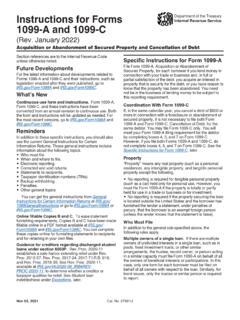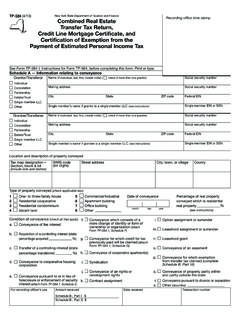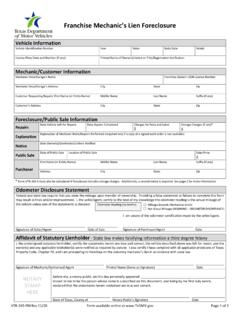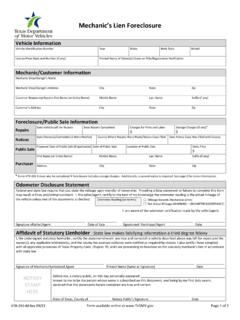Transcription of CHAPTER 3: ESCROW, TAXES, AND INSURANCE
1 HB-2-3550. CHAPTER 3: ESCROW, TAXES, AND INSURANCE . INTRODUCTION. To protect the Agency's interest in the security property, the Customer Service Center (CSC) must ensure that real estate taxes and any other local assessments are paid and that the property remains adequately insured. To ensure that funds are available for these purposes, the Agency requires most borrowers who receive new loans to deposit funds to an escrow account. Borrowers who are not required to establish an escrow account may do so voluntarily. If an escrow account has been established, payments for INSURANCE , taxes, and other assessments are made by the Agency.
2 If an escrow account has not been established, the borrower is responsible for making timely payments. Section 1 of this CHAPTER describes basic requirements for paying taxes and maintaining INSURANCE coverage; Section 2 provides procedure for establishing and maintaining the escrow account; and Section 3 discusses procedures for addressing insured and uninsured losses to the security property. SECTION 1: TAX AND INSURANCE REQUIREMENTS [7 CFR and ]. TAXES AND OTHER LOCAL ASSESSMENTS. The Agency contracts with a tax service to secure tax information for all borrowers.
3 The tax service obtains tax bills due for payment, determines the optimal time to pay the taxes in order to take advantage of any discounts, and provides delinquent tax status on the portfolio. A. Tax Service Fee All borrowers are charged a tax service fee. Borrowers who obtain a subsequent loan are not required to pay a second tax service fee. Refer to the tax service fee schedule shown in Attachment 3-B to determine the fee charged for new loans and new rates and terms assumptions. _____. 3-1. (05-27-98) SPECIAL PN. Revised (06-04-18) PN 513.. HB-2-3550. Paragraph Taxes and Other Local Assessments B.
4 Borrowers Failure to Pay Taxes Borrowers not on escrow are responsible for paying their real estate taxes each year and submitting proof of payment to CSC. When the Agency is notified that a borrower has not paid real estate taxes on the property or other local assessments, CSC must notify the borrower that proof of payment must be submitted to CSC within 60 days. If the borrower fails to submit proof of payment, CSC may pay the taxes and any penalties and charge the cost as an advance to the borrower's account. CSC will not generally pay taxes and penalties in cases where there is another known lien holder, the security property also includes a farm, or net recovery is not anticipated unless it is determined to be in the best interest of the Agency.
5 If the Agency advances funds to pay taxes or INSURANCE , the borrower will be required to convert to escrow. When an escrow account is established, the advance will be repaid over the remaining term of the loan minus ten years. If the loan has less than 10 years remaining, the fee will be spread over 2 years or the remaining term, whichever is less. C. Recapture Receivable Accounts Delinquent tax notices/pending tax sale notices from taxing authorities on recapture receivable accounts should be forwarded to the Tax Unit at the CSC for handling. The notices can be faxed to (314)457-4535.
6 Upon receipt of a notice of pending tax sale, the CSC will review the recapture receivable account to determine if it is in the best interest of the Agency to pay the taxes to avoid the tax sale and protect the Government's interest in the property. If the taxes are paid the CSC will demand payment from the borrower. If payment is not made a foreclosure action will pursue. INSURANCE REQUIREMENTS. Borrowers are responsible for obtaining and continuously maintaining INSURANCE on the security property until the loan is paid in full. Evidence of INSURANCE coverage for the first year of a loan must be provided at closing.
7 In subsequent years, borrowers not on escrow are required INSURANCE on Acquired Property INSURANCE will not be carried on properties that the Agency has acquired. After a foreclosure sale has been held or after a deed in lieu of foreclosure has been filed for record, INSURANCE will not be canceled but will not be renewed. If the property becomes uninsured between the time when the borrower defaults on the loan and the time when the Agency obtains title, the Agency will force place INSURANCE to protect its interests. to pay INSURANCE premiums and send proof of premium payment to CSC annually.
8 For borrowers on escrow, CSC makes the premium payments. _____. 3-2. HB-2-3550. Paragraph INSURANCE Requirements A. Policy Requirements Borrowers must purchase policies from approved INSURANCE companies. Attachment 3-A. provides the minimum standards INSURANCE policies must meet. When a loan is made, Field Staff are responsible for reviewing the applicant's proposed INSURANCE coverage to determine whether it is adequate. CSC also reviews these policies for adequacy when closing documents are forwarded from the Field Office and approves any subsequent changes to borrower INSURANCE policies.
9 Borrowers may need to obtain three types of INSURANCE . 1. Hazard INSURANCE Most borrowers are required to maintain hazard INSURANCE to protect the property against fire, wind, and weather-related damage. These policies may also be called Fire and Extended Coverage, Homeowner's, All Physical Loss, or Broad Form . policies. Any borrower with a secured indebtedness in excess of $15,000 at the time of loan approval must furnish and continually maintain hazard INSURANCE on the security property, with companies, in amounts, and on terms and conditions acceptable to RHS.
10 And include a loss payable clause payable to RHS to protect the Government's interest.. For borrowers initially required to maintain hazard INSURANCE , CSC may force place coverage for the benefit of the Agency and charge the cost to the borrower's account. 2. Flood INSURANCE Flood INSURANCE is required for all properties located in a Special Flood Hazard Area (SFHA), as identified by the Federal Emergency Management Agency (FEMA) and described in RD Instruction , except for loans and grants with an original principal balance of $5,000 or less. FEMA's Standard Flood Hazard Determination is used to document whether a property is in a SFHA and whether flood INSURANCE is available under FEMA's National Flood INSURANCE Program.
![CHAPTER 14: FUNDING [Official Agency Use Only]](/cache/preview/5/1/5/b/5/3/5/c/thumb-515b535cec62fd2bb25fbb788ef1c7a2.jpg)
